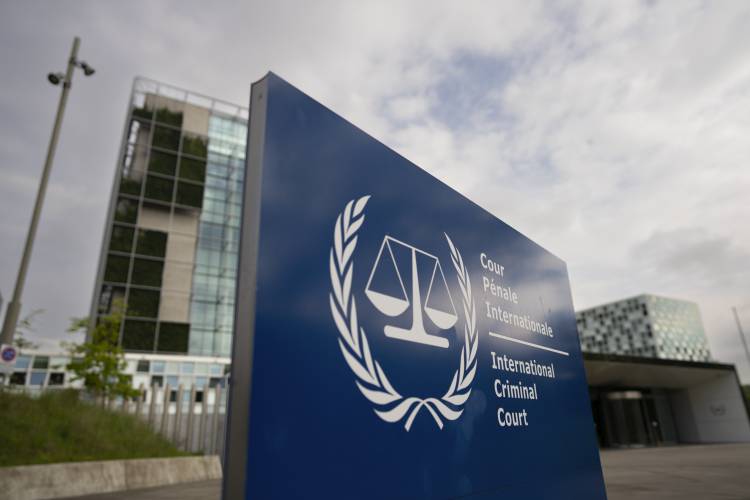Opinion: They doth protest too much: Israel and Hamas nix the ICC

Exterior view of the International Criminal Court, or ICC, in The Hague, Netherlands, on April 30. Peter Dejong/ AP
| Published: 06-01-2024 6:30 AM |
John Buttrick writes from his Vermont Folk Rocker in his Concord home, Minds Crossing. He can be reached at johndbuttrick@gmail.com.
Karim A. A. Khan, International Criminal Court’s chief prosecutor, has applied for warrants to arrest Israeli Prime Minister Benjamin Netanyahu, Defense Minister Yoav Gallant and three Hamas leaders: Yehia Sinwar, Mohammed Deif and Ismail Haniyeh.
The ICC believes it has evidence that these leaders are responsible for war crimes and crimes against humanity in the Gaza Strip and Israel, as well as in the Palestinian West Bank. A determination on whether to issue the warrants will be made by the panel of ICC judges who oversee such decisions for the court.
President Biden protested, “whatever the ICC prosecutor might imply (by asking for all those warrants at the same time), there is no equivalence … between Israel and Hamas.”
Prime Minister Netanyahu argued that requesting arrest warrants against Israeli and Hamas officials together, is an attempt to create “a ‘false symmetry’ between the democratically elected leaders of Israel and the terrorist tyrants of Hamas.”
At the same time, Hamas also denounced the ICC prosecutor’s request for those simultaneous warrants, saying it “equates the victim with the executioner.” To the contrary, it is just as easy to interpret the ICC warrants, issued against leaders on both sides in the war, as even handed and unbiased.
It is apparent that the Israeli and Hamas leaders protest too much. By vigorously criticizing the ICC’s method, they keep the warrant charges hidden in the shadows. They speak only of their revulsion at being equated with the enemy. Those feelings open the door to hegemony, racism, and apartheid. However, they are deaf to the ICC’s intention to be evenhanded. Rebecca Hamilton, a law professor at American University writes, “If the I.C.C. is to uphold this idea that the rule of law applies equally to everybody, then when it has evidence of crimes committed in one context, and another, it should treat both equally.”
It is apparent that the ICC it is not implying a common identity between the two adversaries, but is applying for warrants for humanitarian law violations of two disparate enemies in a common war. It follows, the debate should be about evidence of a humanitarian crisis in Gaza: displacing roughly 80% of the population and leaving hundreds of thousands of people on the brink of starvation, according to U.N. officials.
Article continues after...
Yesterday's Most Read Articles
The debate should be about the conditions of the invasion into Israel — the massacre of scores of revelers at a dance party, families killed in their homes, hostage taking, and torture. Also, the reasons and motives of both sides should be clarified. “Protesting too much,” because of personal feelings, is an attempt to avoid any deliberations about the war conduct of Israel and Hamas and its consequences.
The ICC was endorsed by the United Nations General Assembly and the Security Council in 2002 as the permanent court of last resort, to prosecute individuals responsible for the world’s most heinous atrocities: war crimes, crimes against humanity, genocide and crimes of aggression. However, without a police force, the ICC relies on member states to arrest suspects.
Therefore, opponents of ICC actions maintain that it is futile and unreasonable to investigate the charges or seek warrants when the court has no power of enforcement. Similar to debating “feelings” about the warrants, this narrative ignores the substance of the warrant by challenging the power and effectiveness of the ICC. However, the ICC has experienced some success. PBS News Hour reports that the ICC has 17 ongoing investigations, issued a total of 42 arrest warrants and taken 21 suspects into custody. Its judges have convicted 10 suspects and acquitted four.
A final protest concerns a challenge to the moral integrity of the ICC and its supporters. For example, Netanyahu and other Israeli leaders condemn the issuing of the warrants as “disgraceful and anti-Semitic.” They seek to discredit and blame the ICC for being biased and irresponsible. Blaming critics, citizens of other countries, and political leaders avoids any discussion of possible crimes against humanity. Relying on blame only solicits defensiveness, mistrust, and alienation. Blaming is another demonstration of protesting too much.
Protesting with hurt feelings, with claiming a powerless and ineffective ICC, and with placing blame on others; obscure the real issue: the conduct of the combatants in the Israeli/Hamas war. Ferreting out the truth is nearly impossible as long as there is a refusal to debate the content of the warrants. There needs to be a willingness to listen, understand, critique acts not the actors, confess violations, and commit to not repeating any proven violations.
With its request for warrants to arrest the two Israeli leaders and the three Hamas leaders, the International Criminal Court has cleared the way forward toward justice and perhaps a peaceful solution to the Israeli occupation of the Palestinian West Bank and its blockade of Gaza. It may also diminish the felt need to protest too much.







 Opinion: What Coolidge’s century-old decision can teach us today
Opinion: What Coolidge’s century-old decision can teach us today Opinion: The art of diplomacy
Opinion: The art of diplomacy Opinion: After Roe: Three years of resistance, care and community
Opinion: After Roe: Three years of resistance, care and community Opinion: Iran and Gaza: A U.S. foreign policy of barbarism
Opinion: Iran and Gaza: A U.S. foreign policy of barbarism
